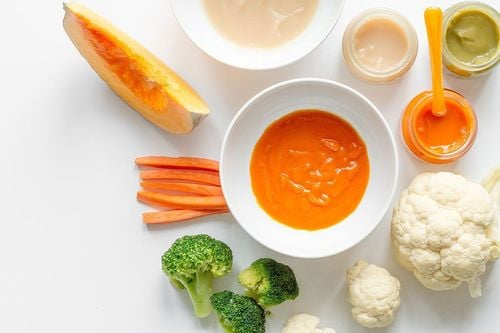This is an automatically translated article.
19-month-old babies usually already have at least 16 baby teeth. At this time, many parents wonder if their 19-month-old baby can eat rice yet? What is the diet for a 19-month-old baby? Here are some useful information to help parents take care of their 19-month-old baby in the right way.
1. Can a 19-month-old baby eat rice?
When children enter the stage of rough eating, it has never been easy for both mother and baby to practice feeding them rice. If the family chooses the wrong time to teach the child to eat, feeding too early or too late will adversely affect the health of the child. Specifically, when the baby has not yet developed enough teeth to chew and grind food, eating rice immediately will cause damage to the child's immature digestive system. On the contrary, if they learn to eat rice too late, it will be difficult for children to adapt to using their jaws to chew food, even anorexia makes parents more difficult in the process of learning how to eat for children.
According to pediatric experts, 19-month-old babies usually have at least 16 baby teeth, so they can get used to crushed rice. After 24 months of age, children have about 20 teeth and enter the porridge eating stage, at this time they can chew, bite and crush soft foods. After 30 months of age, babies can eat rice normally, but parents should prioritize foods that are soft, easy to chew, swallow, or chopped to make them easier to absorb.
When parents choose the right time to practice eating for their children, children will be excited about eating and freely explore different flavors. In general, between the ages of 18 and 24 months, babies can already eat 3 main meals a day with sticky rice and porridge.
2. Diet for a 19-month-old baby
Normally, children will go through stages of learning to eat, including: eating flour, eating pureed porridge, eating porridge, eating pasty rice (broken rice), eating normal grain rice. Thus, just like the weaning phase needs to start from thin porridge, the mother should let the baby get used to crushed rice before eating regular rice so that the baby can adapt gradually.When just learning to eat, parents should not force their baby to eat too much, instead, they should eat little by little and gradually increase the frequency of eating. To create good eating habits, each meal should last only 30 minutes. If your baby sucks on food or is not interested in food, do not force him to eat to reach the desired weight.
Parents should keep in mind, the most important thing is to create fun for the baby to like to eat, excited to eat. When your child enjoys eating, he will cooperate and eating will become easier from there.

Giải đáp bé 19 tháng ăn cơm được chưa?
3. Notes when feeding a 19-month-old baby with rice
Here are some notes to help parents practice feeding their 19-month-old children:
Before meals, do not give children snacks (candy, drink milk, sweet foods...). These foods often create a false feeling of fullness that makes children not want to eat rice or other foods. Attention should be paid to the nutrition of a 19-month-old baby when preparing food. Specifically, each meal should have enough starch (rice, vermicelli, vermicelli), protein (fish, meat, eggs, shrimp, crab, tofu...) and fiber (fruits, vegetables... ). At this stage, babies are also very interested in new foods, so mothers should also regularly change foods and processing methods to create a new and delicious feeling. To make it easier for children to chew, it is recommended to stew or chop, cook soft food for children. Limit the use of a blender because it will cause food to be crushed, broken, children will not be able to enjoy the correct taste of food and lose the chewing reflex that the family is trying to practice. Limit giving children unhealthy foods such as: soft drinks, cakes, fried chicken.... Instead, they should increase foods that are healthy, varied and full of nutrients. In addition, this time the baby also needs to be supplemented with necessary micronutrients: Zinc, selenium, chromium, vitamins B1 and B6, Ginger, acerola fruit extract (vitamin C),... to improve taste , eat well, reach the correct height and weight, and exceed the standard, have a good immune system, strengthen the resistance to get sick less often and have less digestive problems.
To have more knowledge about nutrition for 19-month-old babies, parents should regularly visit the website (vinmec.com) and make an appointment with the leading doctors, pediatric specialists - nutritionists when needing advice on diet Food, how to take care of children.













